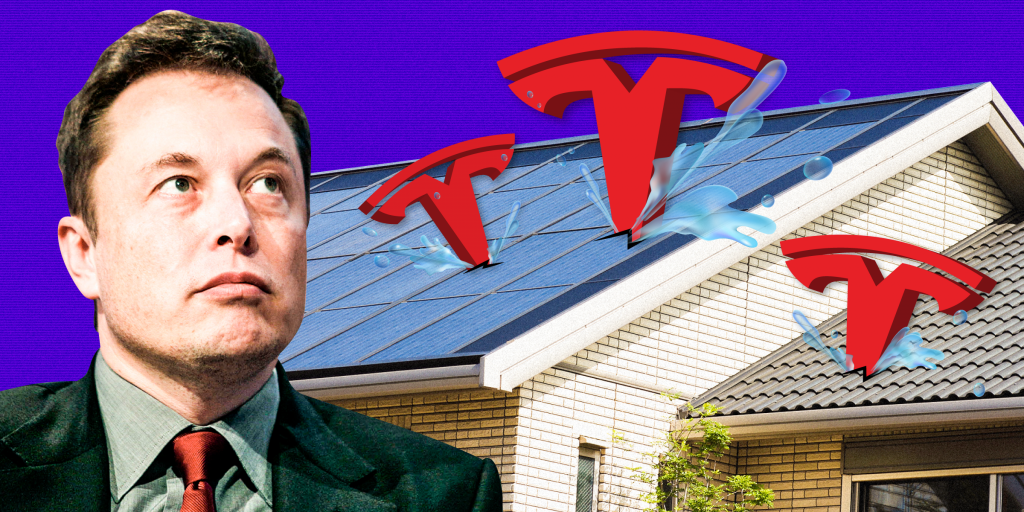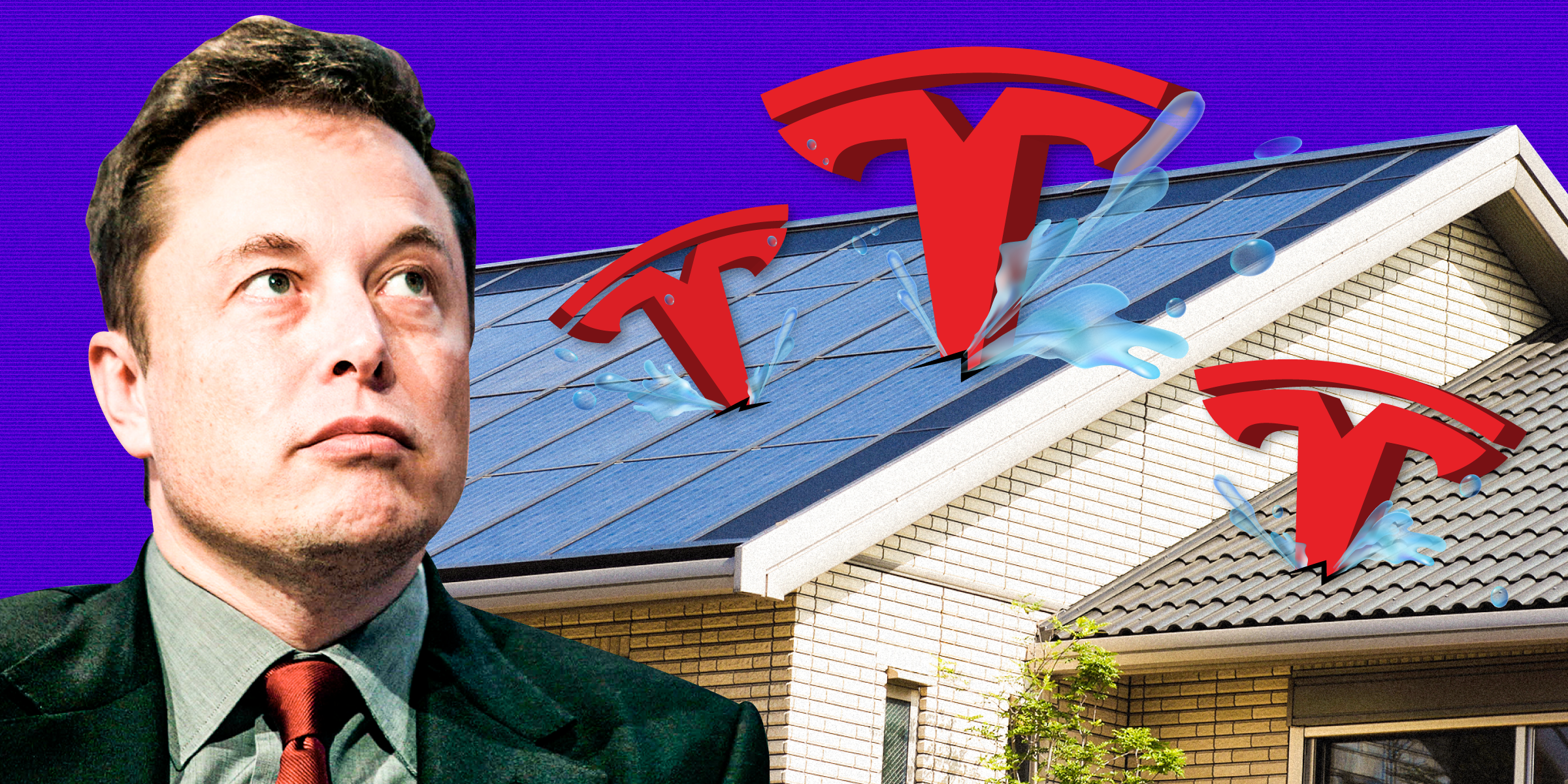
Tesla; Bill Pugliano/Getty Images; Samantha Lee/Insider
- Married couple Jamie Fedorko and Sabrina Ferrer bought a house in 2019 that had Tesla Solar panels installed.
- Since then, their roof has sprung multiple leaks, and their house developed a mold infestation.
- The couple have filed for arbitration to end their contract with Tesla, the only way to potentially end their lease. Tesla has denied the allegations in the arbitration.
- See more stories on Insider's business page.
On Christmas Day 2020, married couple Jamie Fedorko and Sabrina Ferrer woke up to water trickling into their house in Hudson Valley, New York. Overnight, a rainstorm had melted snow drifts on their roof, and water was seeping into a guest bedroom.
They weren't surprised. They'd been dealing with recurring leaks for almost a year, and had spent that year running after the company they believed was the root of the problem – Tesla. Elon Musk's Tesla is best known for its electric cars but it also has a solar energy division, called Tesla Energy, which had installed solar panels on the roof before the couple bought the house.
"My heart sank," Ferrer told Insider, describing the moment she noticed the leak. "I knew that we'd have to spend the entire day on the phone with Tesla trying to convince someone to come out on a holiday." The couple discovered another seven leaks that Christmas Day, she said.
The couple say they have now faced 18 months of recurring, damaging leaks, a severe mold infestation that forced them out of their home for three months, and an ongoing dispute with Tesla over how much money Tesla will pay for repairs.
The couple are fed up, they told Insider. They want to ditch the panels – which they believe have caused multiple leaks – and kill their solar-panel contract. But they feel as if they're effectively trapped in a lease that Tesla won't let them easily escape, they said.
In April, the couple filed a petition for arbitration, which is the only way for them to get out of their contract, per their lease agreement. In arbitration, two parties agree to resolve their dispute outside of court, usually through an official arbitrator.
The petition asked that the company end the lease and cover an alleged $115,000 in damages. Tesla made a settlement offer of $33,000 compensation in February, as confirmed by a document viewed by Insider. Fedorko said the couple rejected the offer because they wanted the $115,000 they believe they're owed, and because they wanted a settlement that ended their lease.
The couple first submitted their petition in April, followed by an amended version in May. Tesla responded on June 18, on the final day of a 20-day deadline following the May filing. Insider viewed Tesla's response, which contained broad denials of the allegations in the petition.
Arbitration responses typically include these, but the couple's lawyer Tom Mullaney told Insider he was hoping for more.
"Tesla's answer contains all it is required to give, and no more," Mullaney said in an email. "I was not surprised to see it, but I was hoping for substantially more from a self-styled, socially conscious company whose customers are suffering from significant damage to their physical environment caused by its products," he said.
Fedorko said his immediate reaction to Tesla's response was that he remained "baffled."
"Wouldn't it be easier if instead of doing what we're doing, Tesla simply worked directly with their paying customers whose lives have been upended by Tesla itself?"
Tesla did not respond to repeated requests for comment from Insider.
While Fedorko and Ferrer's experience is extreme, they aren't alone in their frustration with Tesla Energy. In recent interviews with Insider, several Tesla Energy system owners described what they saw as shockingly unresponsive customer service, even after contacting the company to resolve serious issues, such as leaks.
Fedorko's panels, which were removed seven months ago so the roof could be fixed, are now lying in the couple's backyard.
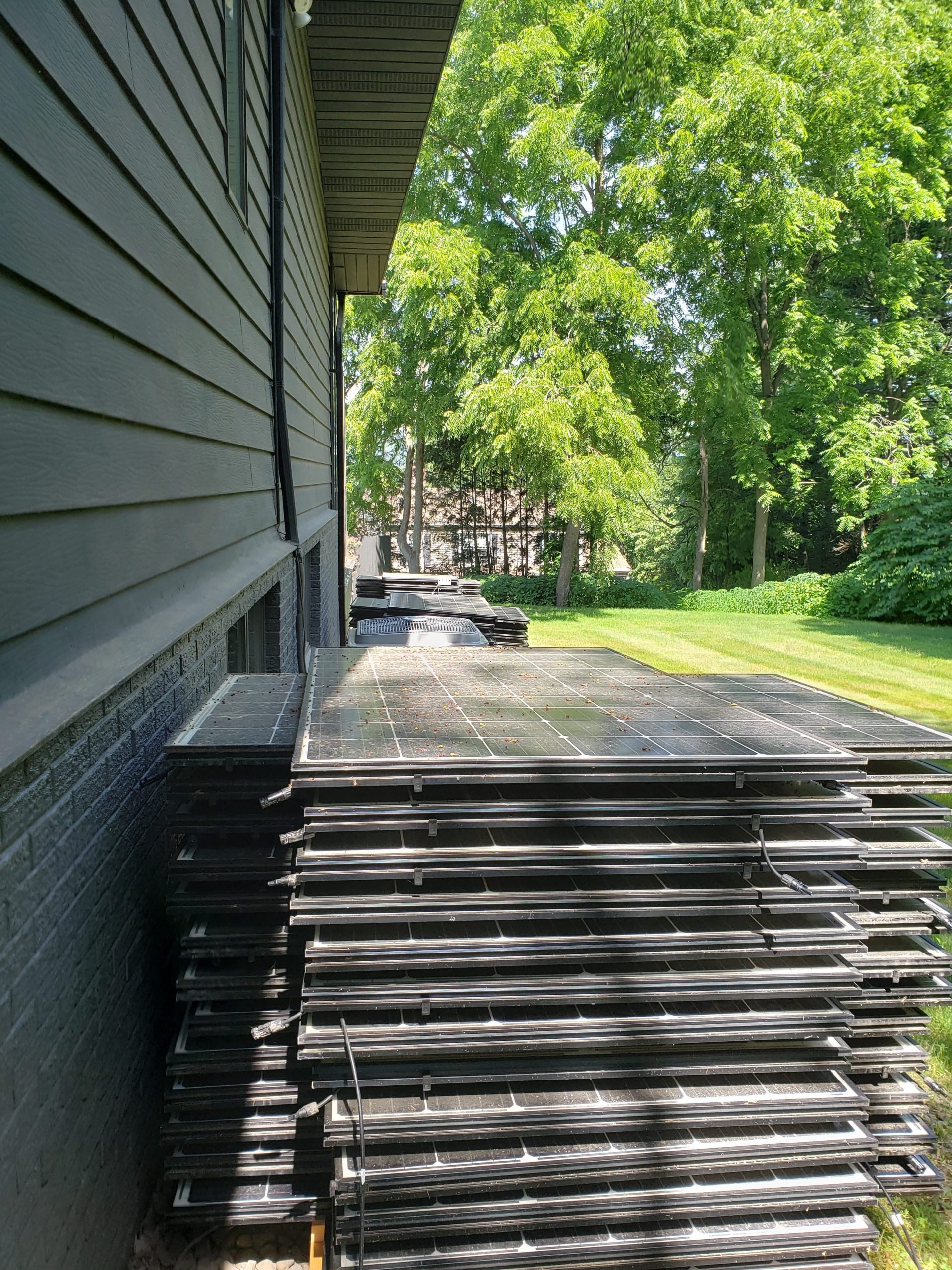
Jamie Fedorko
The leaks began seven months after the couple moved in
Fedorko and Ferrer bought their Hudson Valley house - the first house they'd ever owned - in June 2019 for $570,000. To close the deal, they had to assume the lease of the Tesla Solar panels sitting on the house's roof, Fedorko said.
The couple first discovered a leak in their house in January 2020, he said. Water was seeping into the kitchen, and when Fedorko climbed into the attic he realized the solar panels would have to be removed to properly inspect the roof, he said.
According to a "site visit agreement" viewed by Insider, Tesla charges $200 to send a crew out to investigate problems with solar panels. If the crew then discovers the panels have caused the damage, the fee is waived. Tesla also limits the company's liability for "direct damages" to $500.
Tesla told Fedorko the earliest it could send a crew was four to six weeks, he said. Unhappy with the idea of six weeks' worth of water leaking into his kitchen, Fedorko hired local contractors to take the panels off and reseal the roof.
Once the contractors had resealed the roof in January 2020, everything seemed fine for four weeks - and then two leaks appeared: one in the same spot, and another in a different part of the kitchen, Fedorko said. This time, Tesla sent out a crew of two within two days: one person to fix the roof and another to patch up drywall that had cracked due to the leak, he said.
Fedorko said Tesla reimbursed the fee for the visit, and Insider viewed a correspondence in which a Tesla representative agreed the company would cover an invoice for $480 related to repairing damage caused by the January leaks.
The house sprung leaks three more times in the spring and summer, and then again on Christmas Day, Fedorko said. In an email dated January 15 of this year and viewed by Insider, a Tesla executive resolutions specialist, a kind of dedicated customer service rep, detailed the apparent causes for leaks that occurred in February, July, and December 2020 - all of them to do with the solar panels.
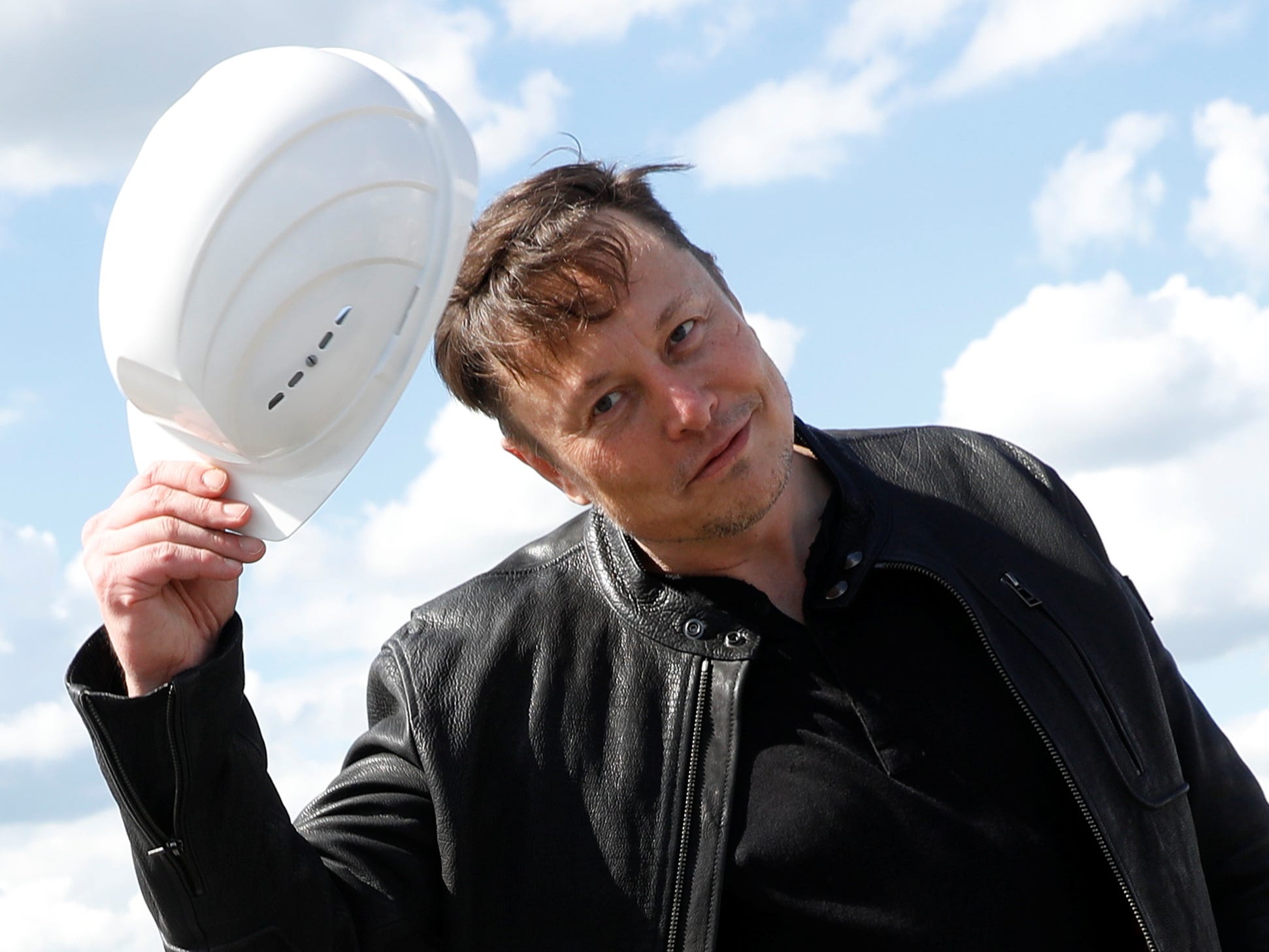
Michele Tantussi/Reuters
Fedorko said he was so exasperated by the spring and summer leaks that in August 2020 he asked Tesla about removing the system and killing the contract.
Tesla said there was no out-clause, and that he'd have to take the company to arbitration.
This isn't unusual for solar-panel companies. Lease contracts for solar panels often come with arbitration clauses rather than simple out-clauses. "Most solar lease contracts are difficult to cancel without legal action," Nick Liberati, communications manager for solar panel comparison site Energy Sage, told Insider.
Exhausted, the couple let the matter rest. "We just said, all right, whatever. Let's hope that this last fix worked and we'll let it go," Fedorko said.
Mold problems
In October 2020, the weather cooled, and the couple turned on the heating more regularly. As they did so, an unpleasant smell began permeating the house, they told Insider.
A month later, Fedorko paid for an H-VAC company to come and inspect the heating system. The company found water had breached the heating ducts, leading to a mold infestation. The heating appeared to be blowing spores around the house, causing the smell, Fedorko said.
Insider viewed a report ordered by the couple's homeowner insurance company, in which an inspector gave his opinion that "water intrusion" through the roof was the source of the mold. Insider also viewed a January bill from a local H-VAC company that said the system had been compromised by "water incursion."
In January, the couple got an independent assessor to determine whether the mold posed a health risk. According to that assessor's report, as viewed by Insider, the mold levels in the attic were 100 times higher than the level considered safe for human habitation. In the rest of the house, they were 10 times higher than the recommended safe level, per the report. This was especially alarming for Fedorko, because he suffers from asthma.
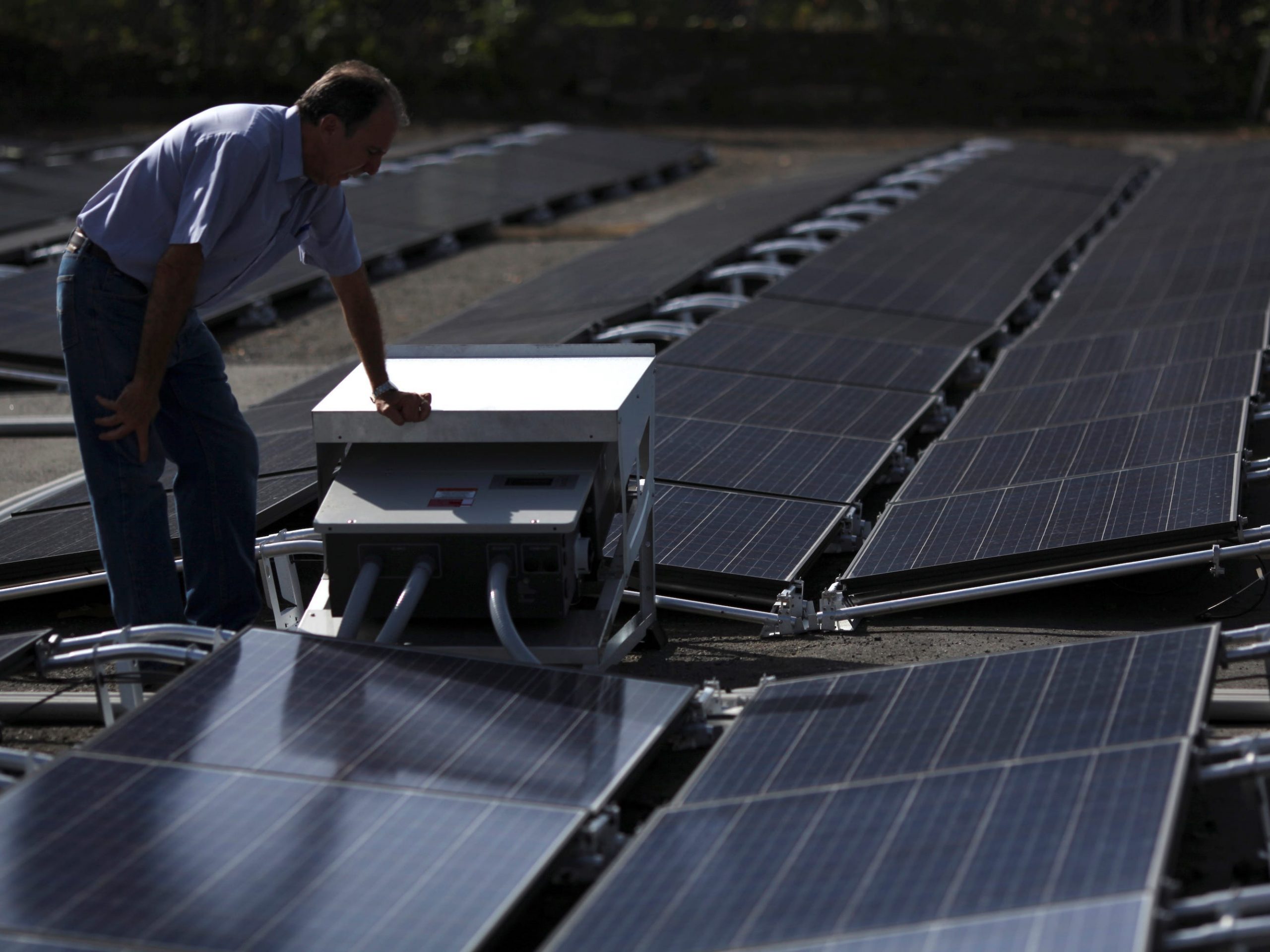
REUTERS/Alvin Baez
The couple moved out immediately, temporarily staying with an elderly uncle while they looked for a place to rent, Fedorko said.
Work on the mold didn't start until February because the couple tried to get Tesla to cover the costs of the work before it started, but could not convince the company to do so. The company made its offer of $33,000, but that didn't cover the full costs of the mold remediation.
Eventually, they decided they could wait no longer.
To get rid of the mold, the couple had to replace the roof shingles and the decking, which had become infested. Next, they had to have their HVAC system repaired, and finally pay for mold remediation throughout the whole house.
"This was by far the most costly, time consuming portion of the repairs," Fedorko said. The mold removers had to go through the entire house deploying purification machines and scrubbing rooms by hand. A bill viewed by Insider showed the mold remediation alone cost $41,900.
The couple said they had to stay out of the home for three months.
Although Tesla offered to pay for many of the leaks - most explicitly, via its $33,000 compensation offer - it denied that the leaks led to the mold infestation.
Fedorko sent the reports he'd gathered on the mold to Tesla, which then sent out an engineer and an adjuster. The adjuster told Fedorko that the mold wasn't caused by the roof leaks - it was the dryer venting into the house's attic space, Fedorko said.
A letter from a heating company later contracted by Fedorko said that this was not the case.
"We found that the dryer was already venting to the exterior of the home and was not venting into the attic. An old pipe which is no longer in use and had already been corrected may have led someone to incorrectly believe otherwise," the letter said.
Once Tesla's Solar panels came off, they could see the extent of the damage
The panels have been off the roof since December 30, 2020, when Tesla sent out a crew to inspect the roof after the Christmas Day leaks.
"We agreed to remove the entire system to assess the condition of the roof, which we'd never done before," Fedorko said.
"Once the panels were off, it was staggering. The roof had soft spots, replacement shingles, it was not in good shape and the foreman said right to my face that the roof clearly wasn't in solid condition to begin with."
In a January 2021 report, an independent inspector hired by Fedorko said there were pre-existing problems with the roof, and that the panels shouldn't have been installed until the roof had been replaced. The report also said the way the panels were installed would have contributed to "seepage."
The couple told Tesla to leave the system off until the roof was fixed, and are determined not to put them back on, they said. They have since paid to replace the roof, and continue to pursue Tesla for reimbursement of their expenses and an end to their lease.
In an email viewed by Insider, the couple's executive resolutions specialist said billing had been paused, but not lifted. There was a "high probability" the couple wouldn't be reported to a credit bureau, the specialist said.
"The house is fine now," Fedorko said. "It's not raining in my living room every time it rains, so that's helpful. But I've worked really hard to make back what we've lost.
"We just feel sort of stupid about the whole thing, in the last year and a half, people are suffering so immensely [...] but the emotional, personal toll has been no joke," he added.
Now, 11 months after they first asked Tesla about ending the contract, the couple is awaiting a schedule for the arbitration process. Meanwhile, the panels are still lying dormant in their backyard.
"We couldn't sell our home if we wanted to."
Do you work at Tesla Energy or are you a Tesla Energy customer? Contact this reporter at [email protected] or [email protected]. Always use a non-work email.
Dit artikel is oorspronkelijk verschenen op z24.nl

